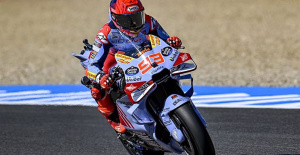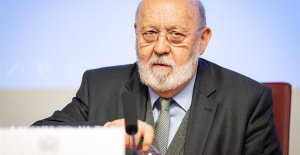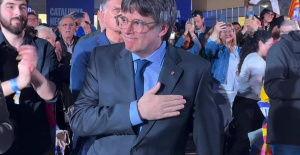It stresses that "the appellant must bear the consequences derived from his own decision and procedural action"
MADRID, 2 Mar. (EUROPA PRESS) -
The Court of Accounts (TCu) refused to lower the sentence imposed on the leaders of 9-N, and that they wanted to cut, leaving the million euros in interest associated with the main sentence of 4.9 million euros at around 590,000 euros. when considering that his true will when consigning that money was to comply with the legal obligation to "guarantee", not to "restitute" the money to the injured party, the Generalitat.
In its resolution, to which Europa Press has had access, the Chamber of Justice of the TCu sets out the reasons why, as announced last Monday, it has rejected the appeal filed by the former counselor Francesc Homs against an order of the last July 28, by which the Prosecution Section already dismissed the challenges of the liquidation of interests practiced.
Homs, whose allegations were supported by former president Artur Mas, Irene Rigau, Joana Ortega, Josefina Valls and Jordi Vilajoana, wanted the interest to be set at 590,547.63 euros. His argument was that the appropriations made "paralyzed or extinguished the accrual of interest", long before on April 30, 2020, the defendants requested to deposit that money in the coffers of the Catalan Government, at which time the TCu finalizes the calculation of interests.
The Chamber of Justice supports the Prosecution Section insofar as it applies the reiterated "doctrine" of the TCu, according to which "the extinction of the obligation to pay interest can only occur if the principal has been delivered or made available to the affected public entity, a circumstance that only occurs in the event as of July 30, 2020".
The TCu recalls that Homs "argues that it should have been previously informed of the contrary interpretation applied in the liquidation, because such an interpretation entails a penalty of the right to appeal and, in addition, violates civil and criminal jurisprudence."
The Prosecutor's Office, for its part, opposed the appeal, arguing that the jurisprudence cited by Homs cannot be applied here because it affected cases where "the consignment was made prior compliance with the sentence handed down to which voluntary compliance was intended, while At present there is no such calming down, since use has been made of the different resources".
The Chamber of Justice delves into these arguments to highlight that, "after the request of the investigating delegate for the parties to state the nature of the payment or guarantee of the consignment, they stated that it did not have the nature of reimbursement but of guarantee" .
"What's more, they subsequently opposed the reimbursement procedure due to scope and filed the pertinent appeals against the sentence issued on the day, including the appeal," he emphasizes.
For this reason, it concludes that "we are dealing with a guarantee or precautionary consignment, before an insurance consignment, and not before a consignment in payment", emphasizing that "the first, as decided in the contested order, does not exonerate the payment of the corresponding interests".
In addition, it highlights that "the lesson that is obtained" from the jurisprudence of the TCu and the Supreme Court "is that the appellant must bear the consequences derived from his own decision and procedural action, to the extent that it affects the obligation to compensate the totality of damages and losses suffered by the affected entity".
"This occurs when the appellant does not accept the provisional liquidation and opposes the reimbursement procedure due to scope, in which case the consignment made (...) has no liberating effects from the accrual of interest, since it is practiced in the face of disagreement with the provisional liquidation, in guarantee of assets, wealth and public effects, in the event of a possible future adverse sentence", he adds.
For the TCu, it is clear that with the consignment made in this case "there is no offer of payment intended to extinguish an obligation (...) --which derives from the provisional settlement act-- but only its assurance, and this precisely by the party's own decision, which, faced with the option of restitution or guarantee, opted for the latter, that is, for the guarantee or assurance, preventing the amount from entering the coffers of the injured party".

 Exploring Cardano: Inner Workings and Advantages of this Cryptocurrency
Exploring Cardano: Inner Workings and Advantages of this Cryptocurrency Seville.- Economy.- Innova.- STSA inaugurates its new painting and sealing hangar in San Pablo, for 18 million
Seville.- Economy.- Innova.- STSA inaugurates its new painting and sealing hangar in San Pablo, for 18 million Innova.- More than 300 volunteers join the Andalucía Compromiso Digital network in one month to facilitate access to ICT
Innova.- More than 300 volunteers join the Andalucía Compromiso Digital network in one month to facilitate access to ICT Innova.-AMP.- Ayesa acquires 51% of Sadiel, which will create new technological engineering products and expand markets
Innova.-AMP.- Ayesa acquires 51% of Sadiel, which will create new technological engineering products and expand markets Marc Márquez returns to pole in Jerez
Marc Márquez returns to pole in Jerez The CIS carries out a quick survey on Sánchez's letter to measure the reaction of citizens
The CIS carries out a quick survey on Sánchez's letter to measure the reaction of citizens 12M.- Puigdemont to Sánchez and Illa: "This is not about the future of the PSOE! What have you believed?"
12M.- Puigdemont to Sánchez and Illa: "This is not about the future of the PSOE! What have you believed?" Díaz proclaims that "the Government is not going to bow down" and asks not to be "on the defensive and locked in" against the right
Díaz proclaims that "the Government is not going to bow down" and asks not to be "on the defensive and locked in" against the right How Blockchain in being used to shape the future
How Blockchain in being used to shape the future Not just BTC and ETH: Here Are Some More Interesting Coins Worth Focusing on
Not just BTC and ETH: Here Are Some More Interesting Coins Worth Focusing on UPV students build a prototype of a wooden house to move to Equatorial Guinea
UPV students build a prototype of a wooden house to move to Equatorial Guinea The UA opens the call for the Impulso 2024 Awards for the best innovative business initiatives
The UA opens the call for the Impulso 2024 Awards for the best innovative business initiatives ALI, virtual assistant from Alicante, internationally recognized by the OECD
ALI, virtual assistant from Alicante, internationally recognized by the OECD Retrópolis brings the golden age of video games and computing to the UPV
Retrópolis brings the golden age of video games and computing to the UPV A million people demonstrate in France against Macron's pension reform
A million people demonstrate in France against Macron's pension reform Russia launches several missiles against "critical infrastructure" in the city of Zaporizhia
Russia launches several missiles against "critical infrastructure" in the city of Zaporizhia A "procession" remembers the dead of the Calabria shipwreck as bodies continue to wash up on the shore
A "procession" remembers the dead of the Calabria shipwreck as bodies continue to wash up on the shore Prison sentences handed down for three prominent Hong Kong pro-democracy activists
Prison sentences handed down for three prominent Hong Kong pro-democracy activists ETH continues to leave trading platforms, Ethereum balance on exchanges lowest in 3 years
ETH continues to leave trading platforms, Ethereum balance on exchanges lowest in 3 years Investors invest $450 million in Consensys, Ethereum incubator now valued at $7 billion
Investors invest $450 million in Consensys, Ethereum incubator now valued at $7 billion Alchemy Integrates Ethereum L2 Product Starknet to Enhance Web3 Scalability at a Price 100x Lower Than L1 Fees
Alchemy Integrates Ethereum L2 Product Starknet to Enhance Web3 Scalability at a Price 100x Lower Than L1 Fees Mining Report: Bitcoin's Electricity Consumption Declines by 25% in Q1 2022
Mining Report: Bitcoin's Electricity Consumption Declines by 25% in Q1 2022 Oil-to-Bitcoin Mining Firm Crusoe Energy Systems Raised $505 Million
Oil-to-Bitcoin Mining Firm Crusoe Energy Systems Raised $505 Million Microbt reveals the latest Bitcoin mining rigs -- Machines produce up to 126 TH/s with custom 5nm chip design
Microbt reveals the latest Bitcoin mining rigs -- Machines produce up to 126 TH/s with custom 5nm chip design Bitcoin's Mining Difficulty Hits a Lifetime High, With More Than 90% of BTC Supply Issued
Bitcoin's Mining Difficulty Hits a Lifetime High, With More Than 90% of BTC Supply Issued The Biggest Movers are Near, EOS, and RUNE during Friday's Selloff
The Biggest Movers are Near, EOS, and RUNE during Friday's Selloff Global Markets Spooked by a Hawkish Fed and Covid, Stocks and Crypto Gain After Musk Buys Twitter
Global Markets Spooked by a Hawkish Fed and Covid, Stocks and Crypto Gain After Musk Buys Twitter Bitso to offset carbon emissions from the Trading Platform's ERC20, ETH, and BTC Transactions
Bitso to offset carbon emissions from the Trading Platform's ERC20, ETH, and BTC Transactions Draftkings Announces 2022 College Hoops NFT Selection for March Madness
Draftkings Announces 2022 College Hoops NFT Selection for March Madness























